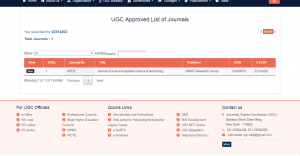1. Ethics on Duplicate Publication
Material submitted to JPAST journal must be original and not published or submitted for publication elsewhere.
JPAST journal considers submissions containing material that has previously formed part of a PhD or other academic thesis which has been published according to the requirements of the institution awarding the qualification.
If an author of a submission is re-using a figure or figures published elsewhere, or that is copyrighted, the author must provide documentation that the previous publisher or copyright holder has given permission for the figure to be re-published. JPAST journal editors consider all material in good faith that their journals have full permission to publish every part of the submitted material, including illustrations.
2. Ethics on Authorship
The JPAST do not require all authors of a research paper to sign the letter of submission, nor do they impose an order on the list of authors. Submission to JPAST means that all the listed authors have agreed all of the contents, including the author list and author contributions statements. The corresponding author is responsible for having ensured that this agreement has been reached, that all authors have agreed to be so listed and approved the manuscript submission to the journal, and for managing all communication between the journal and all co-authors, before and after publication. Any changes to the author list after submission, such as a change in the order of the authors, or the deletion or addition of authors, needs to be approved by every author.
The editors at the JPAST assume that the corresponding author has accepted responsibility includes, but is not limited to: (1) ensuring that original data upon which the submission is based is preserved and retrievable for reanalysis; (2) approving data presentation as representative of the original data; and (3) foreseeing and minimizing obstacles to the sharing of data, materials, algorithms or reagents described in the work.
3. Ethics of Plagiarism and Fabrication
Plagiarism is copying or an attempt to misattribute original authorship, whether of ideas, text or results. As defined by the ORI (Office of Research Integrity), plagiarism can include, “theft or misappropriation of intellectual property and the substantial unattributed textual copying of another’s work”. Plagiarism can be said to have clearly occurred when large chunks of text have been cut-and-pasted without appropriate and unambiguous attribution. Such manuscripts would not be considered for publication in a JPAST.
JPAST journal editors assess all such cases on their individual merits. When plagiarism becomes evident post-publication, we may correct or retract the original publication depending on the degree of plagiarism, context within the published article and its impact on the overall integrity of the published study.





